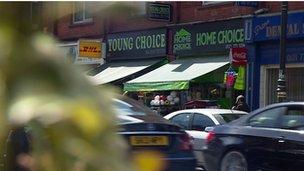EDL bomb plot: Did the police miss it?
- Published

The EDL rally finished early because of a lack of speakers
The guilty pleas, at Woolwich Crown Court, of six men who planned to attack an English Defence League rally raise questions about how much the police and MI5 knew about them.
If the English Defence League had been better organised - and five West Midlands men had arrived earlier, Saturday 30 June 2012 could have been mayhem.
Omar Khan, Jewel Uddin and their friends Anzal Hussain, Mohammed Saud and Zohaib Ahmed left Birmingham in two cars for the two-hour drive to the West Yorkshire town.
The EDL was rallying in Dewsbury and there was a heavy police presence in the town.
But inside one of the cars travelling from Birmingham was a small arsenal - two sawn-off shotguns, one viable homemade bomb, elements of three further pipe bombs, knives and two other small swords, according to the police.
The two cars used for the trip had been bought at relatively short notice and all five occupants had left their mobile phones behind.
Inside the boot, near the weapons, was a bundle of printed statements explaining, in the past tense and dated the same day, why there had been an attack on the rally.
The message was jointly addressed to the "English Drunkards League", the "kuffar [unbeliever] female devil, the self-proclaimed Queen Elizabeth" and Prime Minister David Cameron.
But the attack never came. When the men reached Dewsbury, the EDL had already dispersed because there had not been enough senior speakers to keep the event going.
The five men from Birmingham wandered around, went to a chip shop and then headed home down the M1.
Traffic stop
But a South Yorkshire Police traffic officer did not like the look of the old Renault Laguna carrying Khan and Uddin, so he pulled it over.
Khan initially gave the officer false details but then admitted he was lying - prompting the officer to run a check on the car.
The men had thought the car was insured - but they were wrong. They had got the details wrong when the policy had been bought online.
The officer impounded the vehicle and, as is standard in such cases, told the pair they could ask for it back only when they had insurance.
Khan and Uddin sheepishly got out of the vehicle and took the train to Birmingham.
The traffic officer did not search the vehicle because he had no reasonable suspicion it had been involved in a crime. It had been, to all intents and purposes, a routine and rather mundane insurance stop.
But on the Monday morning, the full story emerged.
Bomb-disposal squad
Staff at the car pound inspected the vehicle and found the weapons in the boot. They called South Yorkshire Police. When its officers arrived and looked in the boot, they called the North East Counter Terrorism Unit - and its officers ultimately called out the Army's bomb-disposal squad.
The main homemade device in the car was an adapted 4ft (1.2m) firework. It had double the normal amount of explosive pellets inside it. It also contained more than 350 nails and almost 100 ball bearings. Police experts concluded the device could kill in a confined space.
Components for three further devices, made from plumbing parts, were nearly identical to designs featured in an English-language al-Qaeda magazine called Inspire.
Police and MI5 officers rushed to work out what had happened. They had the vehicle and the driver's name - and working from there they were able to use number-plate technology and sophisticated convoy analysis of vehicle movements to establish there had been a second car.
Detectives worked frantically through the evening of 2 July to establish who had been involved - and by early the next morning they had Khan and Uddin under close surveillance.
Minutes before he was arrested, Khan called the car pound to ask if he could recover some personal items from inside. All five of the Dewsbury travellers, plus a sixth man, Mohammed Hasseen, were in custody by the next day.
But could this plot have been stopped?
In the months leading up to the aborted attack, Uddin had been under partial surveillance by the West Midlands Counter-Terrorism Unit, a joint team of detectives and MI5 intelligence officers.
During the previous summer he had helped out in charity fundraising by three men who have been subsequently jailed for wanting to be suicide bombers.
The charity drive was a con to fund the cell's plans.
Uddin was not among the group of helpers accused of knowing about the ringleaders' true intentions.
But counter-terrorism chiefs decided to watch him further and covert-surveillance officers would occasionally monitor him to learn more about his life.

A surveillance officer secretly watched Uddin enter this shop in Birmingham
Five days before the aborted EDL attack, one West Midlands surveillance officer watched Uddin and another man go to a homeware shop near his Sparkhill home in Birmingham.
Police later established the man accompanying Uddin was Khan - and that the pair had bought some of the knives found in the car boot.
Further detective work established that Uddin and Hasseen had gone to Dewsbury earlier in June in what police believe was a reconnaissance trip.
On that particular day, nobody had been assigned to monitor Uddin.
At the time, the security services did not believe that Uddin was involved in any attack planning - and counter-terrorism chiefs only assign round-the-clock surveillance when they have intelligence somebody is involved in a very serious plot, such as an advanced attack plan.
Uddin was one of many people whom counter-terrorism officers try to investigate when they are concerned about their activities but have neither hard criminal evidence nor partial intelligence of wrongdoing.
Meanwhile, another of the six, Ahmed, was on bail at the time of the Dewsbury trip, having been charged with possessing a jihadist magazines containing articles on bomb making.
So did the police and MI5 drop the ball?
Since the EDL arrests, there have been reviews inside West Midlands Police and the security service over the decisions relating to Uddin - and they concluded that no dots had been un-joined.
But nevertheless, the case has echoes of the accusations of security failings over the 7 July 2005 attacks on London.
The later inquests showed how close MI5 had come to information that may have identified the ringleader at a threat.